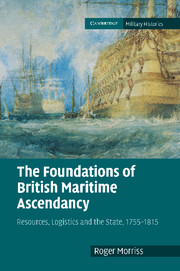Book contents
- Frontmatter
- Contents
- List of tables
- Preface
- Glossary of British weights, measures, casks and money values
- List of abbreviations
- Introduction
- 1 The British state in evolution
- 2 Defence and expansion
- 3 Economy and finance
- 4 Naval growth and infrastructure
- 5 Ordnance and technology
- 6 Manpower and motivation
- 7 Foodstuffs and victualling
- 8 Shipping and transportation
- 9 The supply of land forces overseas
- Conclusion
- Bibliography
- Index
- References
3 - Economy and finance
Published online by Cambridge University Press: 10 January 2011
- Frontmatter
- Contents
- List of tables
- Preface
- Glossary of British weights, measures, casks and money values
- List of abbreviations
- Introduction
- 1 The British state in evolution
- 2 Defence and expansion
- 3 Economy and finance
- 4 Naval growth and infrastructure
- 5 Ordnance and technology
- 6 Manpower and motivation
- 7 Foodstuffs and victualling
- 8 Shipping and transportation
- 9 The supply of land forces overseas
- Conclusion
- Bibliography
- Index
- References
Summary
The geographical expansion of the British state in the eighteenth century benefited from a pre-existing maritime economy of global dimensions, within which was constructed a structure of trade and navigation laws intended to promote trade between mother country and colonies. Trade within and beyond the empire, built upon networks of credit, helped to support the state's system of credit, debt and taxation, of which some of the leading beneficiaries were contractors operating in the colonies. The maritime economy and financial system proved resilient and adaptive to wars of growing scale. Indeed, the combination gave Britain her special power. Moreover, reform and rising trust enhanced confidence in Britain's economic capacity to sustain war. But the process of reform was a long one. Private profiteers had to be checked and control of public expenditure shifted slowly from Parliament to the Treasury. By their spending, the military departments during the second half of the eighteenth century were able to exert considerable influence on the growth of the British economy, for they added to domestic demand, had some flexibility in the management of their money and audited their own accounts. Yet from the late 1790s public insistence on individual responsibility and a growth of Treasury control gradually checked the power of the bureaucracy and counteracted fears of the uncontrolled growth of debt.
- Type
- Chapter
- Information
- The Foundations of British Maritime AscendancyResources, Logistics and the State, 1755–1815, pp. 78 - 130Publisher: Cambridge University PressPrint publication year: 2010

